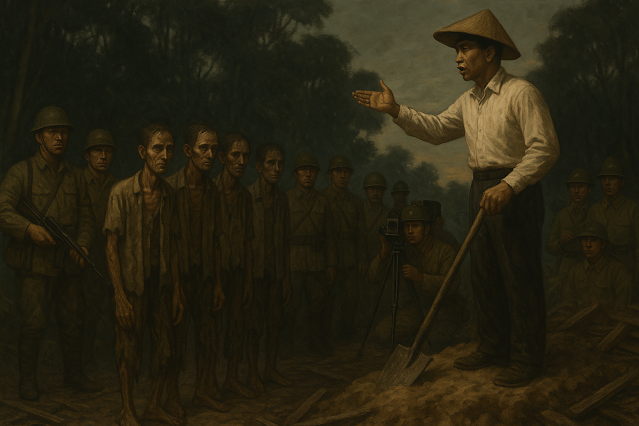Sometimes the devil doesn’t come with a pitchfork and horns.
Sometimes he comes bearing gifts, wrapped in silk promises and national pride.
Sukarno knew this, felt it in his bones as he shook hands with the Dai Nippon officials,
their fingers cool and dry against his palm. The Japanese occupation of
Indonesia wasn’t going to end with a bang or a whimper—it was going to end with
a handshake and a whispered bargain.
“Independence,” they promised. Just one little thing in
return.
You ever made a deal you knew would haunt you? Sukarno did.
I’m talking about the kind of deal where you wake up at three in the morning,
sweat-soaked and gasping, because your dreams are filled with the faces of the
dead. The kind where you tell yourself it was necessary, but deep down—in that
place where a man keeps his darkest truths—you wonder if you sold your soul too
cheap.
When asked about the romusha—Christ, what a clean word for
such a dirty business—Sukarno had a ready answer. In his autobiography, told to
Cindy Adams back in ‘65, he laid it out plain as day: there were two paths when
facing the Japanese. Fight them like the PETA rebels, or play along. Sukarno
chose door number two.
“I collaborated,” he admitted. No sugarcoating there. “I
waited for the enemy to fall while building our strength.”
Gabriel Kolko, in his book The Politics of War,
called it like he saw it. Sukarno and Mohammad Hatta were collaborators, plain
and simple. The strategy? Buddy up to the Japanese, get them to kick out the
Dutch, and secure that golden promise of independence.
But promises, as any kid growing up in Mayfield could tell
you, come with prices.
The newsreel footage still exists, believe it or not. You
can find it on YouTube—a strange, surreal glimpse into the past, like peering
through a keyhole into hell’s waiting room. There’s Sukarno, looking like any
small-town mayor at a Fourth of July parade, leading a column of men wearing
straw hats. Beside him walks Mohammad Hatta, and there’s Adam Malik up front.
The street’s lined with people, cheering like they’re at a goddamn carnival.
Except it wasn’t a carnival. It was a death march.
These men were romusha—forced laborers condemned to build
railways, dig mines, construct airfields. Building the Japanese war machine one
broken back at a time. One bloody handful of dirt at a time.
Sukarno climbs onto a mound of sand, turns to face these
walking dead men, and delivers a speech:
“If you remember the immense sacrifices made by the soldiers
of Dai Nippon and Indonesian soldiers on the battlefield, and recall the great
sacrifices of ordinary romusha, then you will not see this work as a burden.”
Not a burden? Jesus Christ.
The Japanese propaganda cameras rolled. See? Even Sukarno
supports this. Why don’t you?
After filming wrapped, Sukarno and his entourage went back
to Jakarta, like actors finishing a day on set. Meanwhile, the actual
romusha—not the photo op kind, but the real flesh-and-blood Indonesians—they
stayed behind. They suffered. They died.
Of the ones sent to Burma, most never saw Indonesia again.
Of those who built the Saketi-Bayah railway—93,000 souls. Gone.
In his autobiography, Sukarno didn’t run from it. Give him
that much.
“In reality, I—Sukarno—was the one who sent them to work.
Yes, it was me. I sent them sailing to their deaths. Yes, yes, yes, yes, it was
me.”
You can almost hear the man’s voice breaking there, can’t
you? The repetition—yes, yes, yes, yes—like a man trying to convince himself as
much as his audience.
“I made statements to support the mobilization of romusha.
My picture was taken near Bogor with a conical hat on my head and a hoe in my
hand to show how easy and noble it was to be a romusha.”
Easy. Noble. Words that must have tasted like ashes in his
mouth.
The independence fighters were furious, of course. Their
leader, the man supposed to free them from colonial chains, was “selling” his
own people. Loading them into closed wagons, packed tight as cigarettes in a
carton. Men reduced to skin stretched over bone, moving like the walking dead
through jungle work camps.
Picture this: A poster circulating through villages and
towns. Skeletal men with hollow eyes staring out at you. The caption reads: “Soekakah
anak pembatja mendjadi begini?” Would you like your children to become like
this?
And at the bottom, a dagger thrust directly at Sukarno’s
heart: “Engineer Soekarno! How does it feel in your heart to see the result of
your work like this??”
His old friend Musso—they’d shared rooms once, back in
Surabaya—used it against him later. Called him a sellout, not just to Japan but
to American imperialism too. Used Sukarno’s romusha past as bloody campaign
material.
But here’s the thing about the devil’s bargain: sometimes it
works out just like you planned. Sometimes you rise from the ashes,
phoenix-like, while the bodies burn beneath you.
Sukarno remained defiant to the end. In his mind, he’d made
the only choice he could. The hard choice. The necessary choice.
“With every fiber of my being, I only think of my homeland,”
he wrote. “It doesn’t matter if someone calls me a collaborator, because I don’t
need to prove to them or to the world what I have done. The pages of the
Indonesian Revolution will be written with Sukarno’s blood. History will clear
my name.”
But history doesn’t clear names. History just records, cold
and unblinking, while men justify the horrors they’ve unleashed. While they lie
awake at night, counting their dead like sheep.
Sukarno sent those men to die, and somewhere in Jakarta—if
you listen closely in the dead of night—you might still hear him whispering: Yes,
yes, yes, yes. It was me.
The price of freedom is high. Sometimes it’s paid in other
people’s blood.

Comments
Post a Comment